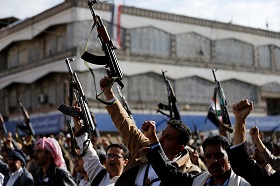Moscow is wary of any involvement in the Iranian-Saudi rivalry, to say nothing of the Sunni-Shiite face-off. While direct dividends are barely visible, the risks and prospects for realization of Russia's long-term interests in the Middle East seem much more palpable. This is why Moscow is lingering over recognizing or closely cooperating with the Houthi on the official level, at the same time maintaining certain contacts.
A second front seems to have been fully opened up in the Middle East by the whirlwind events in Yemen, which few predicted and hence have generated numerous forecasts regarding the consequences for the broader security of the Arabia Peninsula and the Middle East as a whole. They state that the Yemen crisis will trigger Saudi Arabia’s decline, because the Yemenis will drop their domestic squabble and close ranks to face the external threat. Others believe that the area is in for a full-scale war between the Sunni and the Shiite with direct and indirect involvement of external actors.
Russian diplomats and oriental studies experts had seen the disquieting symptoms of a potential escalation in the 25-million country long before the outbreak of this conflict. But now the United States, Russia and some European countries are hastily evacuating their citizens, diplomats included, meaning that they regard the situation as really grave. Yemen is currently more than unsafe, with deserted buildings looted and diplomatic missions attacked, as was the case with the Russian consulate in Aden. The premises had already been seriously damaged by Saudi air raids.
The Russia-Yemen relationship is several decades long, and reached its peak during the Soviet period. Diplomatic relations between the USSR and the Mutawakkilite Kingdom of Yemen were established in 1955, and the two countries managed to develop a meaningful, although compact, bilateral agenda. Until the USSR collapsed, South Yemen received over 4,500 Soviet military instructors. After a pause in the 1990s due to reduced interest in Yemen and objective hardships facing Russian diplomacy, the then united Yemen vibrantly reappeared on the radar of Moscow's Middle East policy. In 2010, bilateral trade grew by 5.5 percent to reach USD 167.5 million. Humanitarian assistance is another key avenue of cooperation that boasts deep historical roots, since the Soviet Union and Russia trained over 50,000 Yemeni specialists.
Russian experts offer three basic explanations for the origins of the Yemen crisis.
The domestic narrative regards Yemen as the Middle East in miniature. On the one hand, Yemen is swept by famine afflicting 45 percent of the population, catastrophic poverty and skyrocketing numbers of uneducated but politically active young people, which effectively fuels social unrest. On the other, Yemen is a Gordian knot of intertribal controversies. Skirmishes are frequent even within tribes and per capita firearms possession is sky-high, which means that practically any protest could easily descend into large-scale fighting. The immense conflict potential and numerous ungoverned grey zones attracted al-Qaeda in the Arabian Peninsula, a powerful regional terrorist organization that is gaining ground in this snowballing crisis.
The regional narrative suggests that Yemen presents a battlefield for the Iran-led Shiites and Saudi Arabia, the self-proclaimed Sunni leader. The two countries are generally seen by pundits as regional rivals in many different locations from Syria and Lebanon to Bahrain and Yemen. To this end, the Houthi success seems to hurt the Saudis and to some extent the Americans, and to bolster Iran. Rejected by Western governments at an earlier stage, the Houthi are searching for allies among actors beyond the region. Last February, a delegation of the Houthi Ansar Allah and the General People's Congress of ex-president Saleh visited Moscow. According to some data, they offered Russia lucrative contracts in trade and development of oil provinces that "will soon come under their control."
Moscow can use the Yemenis' proposals at least in two ways.
First, cooperation might strengthen Russia's overall positions in a country considered a strategic outpost since the Soviet times. Yemen's geopolitical significance is beyond doubt, suffice it to mention its key position on commercial routes from the Red Sea across the Gulf of Aden to the Arabian Sea and the Indian Ocean.
Second, Russia might obtain some kind of leverage on Saudi Arabia, which has not been friendly to Moscow for about 20 years. Moscow is well aware that the Saudis are seriously concerned about the region. It would be rational to consider creating some pressure on the sworn friends. At least, the Houthi and possibly their pillion drivers must have had this in mind.
In fact, Russia regards the Yemen crisis as a systemic and long-term affair, and is under no illusions about the real prospects for its political or economic presence there.
Moreover, Moscow is wary of any involvement in the Iranian-Saudi rivalry, to say nothing of the Sunni-Shiite face-off. While direct dividends are barely visible, the risks and prospects for realization of Russia's long-term interests in the Middle East seem much more palpable. This is why Moscow is lingering over recognizing or closely cooperating with the Houthi on the official level, at the same time maintaining certain contacts. Whereas Riyadh is anxious about the Shiite radicals, Moscow seems scared by ISIS as the threat could be projected to the North Caucasus and Volga River area. When all interested parties are urgently seeking allies to confront the Islamic State, Moscow may regard the anti-ISIS Houthi at least as a situational partner.
It seems reckless for any state to get deeply involved in a conflict-ridden country overcrowded with actors and poor in resources. To this end, against the backdrop of swelling chaos, prudence alone should prompt Moscow to hold the field and stick to selective remote engagement despite provocations like the recent bombing and the consulate attack, quite a slippery but unavoidable path.






